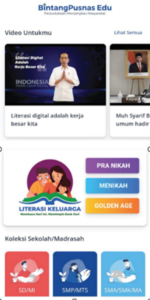Strengthening Family Literacy: Efforts to Reach Indonesia Emas 2045
19 February 2024
The Indonesia Emas (Golden Indonesia) 2045 is a national vision marking 100 years of Indonesia’s independence. In 2045, it is predicted that Indonesia will reach a demographic bonus where the total population will be dominated by people in the productive age between 15 to 64 years old. If adequately prepared and utilised, the demographic bonus will have a positive impact on the country’s economic development. However, the demographic bonus can also bring about negative impacts if not managed well. the abundance of working age people who do not have skills and expertise can lead to increased unemployment, crime, poverty and hamper economic growth. Therefore, the quality of the human resources is the key determinant of Indonesia’s future.
Education
Children are the beginning of quality human resources. In Indonesia, the prevailing tendency is that many families entrust the growth and intellectual progress of their children entirely to teachers in schools. Schools are often seen as the primary factor shaping a child’s character and development. In reality, the family is the primary social institution for the child. Education in the family has an important role in the process of forming a child’s character and intellectual progress because the family is where a child grows and develops from an early age. The family environment, especially parents, therefore has a significant influence on a child’s development, and strengthening family literacy hence becomes essential and fundamental.
Family Literacy
Family literacy is a concept that describes how family members interact with each other with language, reading, and communication in their daily lives. Family literacy can help children develop their literacy skills from an early age, which is a factor that will impact their academic competencies and character in the long term.

Based on research by Raikes (2012) in the book Experience Human Development, it was found that children who read stories every day showed better thinking and language skills at the age of 3. The research sample involved 2,581 families with low socioeconomic status. The benefit of reading activities from an early age is to familiarise children with good habits in their lives. Reading from an early age for children is highly effective in building cognitive, motor, language, socio-emotional, religious, and moral intelligence in children. (Bondar, 2023).
Internet Penetration
Today, digital technology cannot be separated from daily life, including children’s education. In Indonesia, the internet penetration rate reached 77% of the total population or around 212.9 million people out of 276.4 million Indonesians (source: wearesocial.com). This indicates that internet access has become one of the essential needs of society. This phenomenon presents both opportunities and challenges for family literacy. In terms of opportunities, the internet possesses great potential in encouraging literacy and library transformation. This enables the broader dissemination of information and knowledge, without being limited by geographic distance or physical limitations. However, it is also important to ensure the balance between broad internet access and adequate digital literacy. People need to be equipped with the necessary skills to understand and utilise the information they encounter online.
Strengthening Family Literacy Program on Digital Platforms
The National Library of Indonesia introduced the Strengthening Family Literacy Program, which is based on digital platforms including mobile applications. The programme is a new initiative to expand access to library services targeting three main audience groups: pre-marriage couples, new families, and children in the golden age. These groups will receive short messages via smartphones complete with digital access links to access digital books, tutorials, audiobooks, and music according to the group category.
For the pre-marriage group, they will receive useful information to understand themselves and their partners, build strong relationships, healthy marriages, physical, mental and financial readiness, family principles and reproductive health.
For the new families group consisting of newlyweds, expectant mothers, and mothers who are breastfeeding, the information shared with will include nutrition for expectant mothers and their babies, the importance of the father’s role during pregnancy, and foetal stimulation techniques.
For the category of children in the golden age range from 0 to 4 years old, the educational information provided includes content on children’s nutritional intake, disease prevention, immunisation, stimulation of children’s growth, parenting patterns, children’s health care, and edutainment content. The content for this group was accepted by parents as a guide for raising golden age children.

At the same time, information can be obtained through the National Library of Indonesia’s mobile applications iPusnas and Bintangpusnas.edu, as well as Titik Baca (or Digital Reading Point), which is a digital library concept that aims to provide easier access to books by scanning QR codes.
In the long term, this programme is projected to have an indirect effect on reducing malnutrition and stunting rates in Indonesia. This is because malnutrition and stunting occur not only because of economic poverty, but also due to the lack of information or ignorance. Therefore, it is important to build a strong literacy culture as a foundation to improve the quality of human resources for the progress and prosperity of the nation.
Contributed by Sadariyah Ariningrum Wijiastuti, Librarian, National Library of Indonesia
Reference:
Bondar, Adin. (2023). Literasi Berawal Dari Diksi Berakhir pada Aksi. Makassar: Yapensi.
Papalia, D., Feldman, R., & Martorell, G. (2012). Experience Human Development. New York: Mc Graw-Hill
We are Social. (2023, November 1). Indonesia Digital 2023. https://wearesocial.com/